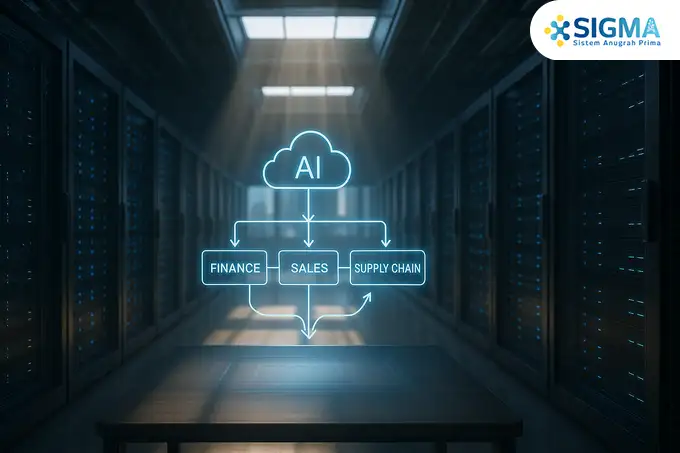In today’s era of rapid digital transformation, the ability to adapt, innovate, and make data-driven decisions has become the cornerstone of success. Businesses can no longer rely on fragmented systems that obstruct the flow of information.
This is why cloud-based Enterprise Resource Planning (ERP) solutions—particularly SAP Cloud ERP—have emerged as a strategic foundation for modern organizations, from growing SMEs to global corporations.
SAP Cloud ERP is not merely software, but a fully integrated business ecosystem delivering end-to-end solutions to manage every aspect of operations. From finance to human capital management, all processes converge within one intelligent platform.
Understanding the core features of SAP Cloud ERP is the first step toward unlocking extraordinary efficiency and growth.
To provide a clearer picture, here are some of the essential modules of SAP Cloud ERP that we shall explore in depth:
- Financial Management & Accounting
- Supply Chain Management (SCM) & Procurement
- Inventory & Warehouse Management
- Manufacturing & Production Planning
- Sales & Customer Relationship Management (CRM)
- Human Resources (HR) & Payroll
- Business Intelligence & Analytics
- Integration & Application Ecosystem
Let us delve into each module and examine how SAP Cloud ERP can revolutionize the way your enterprise operates.
Finance & Accounting: The Financial Heart of Your Enterprise
Every business decision ultimately converges on its financial impact. The SAP Cloud ERP Finance & Accounting module serves as the central nervous system of corporate finance, ensuring precision, compliance, and real-time visibility.
Key Financial Features:
- General Ledger (GL): A centralized ledger that records every financial transaction automatically.
- Accounts Payable (AP): Streamlined management of vendor invoices and automated payment processing.
- Accounts Receivable (AR): Monitors customer receivables, manages invoicing, and accelerates cash inflows.
- Fixed Asset Management: Oversees the lifecycle of fixed assets, from acquisition to depreciation and disposal.
- Cash Flow Management: Provides real-time forecasts and liquidity analysis for smarter financial decisions.
Core Strengths:
The standout advantage lies in its capacity to deliver instant financial reporting. With full multi-currency and multi-company support, enterprises can seamlessly consolidate reports and remain compliant with both local (PSAK) and international (IFRS) accounting standards.
Business Relevance:
Month-end closing becomes significantly faster, audits are simplified with transparent digital trails, and executives gain accurate financial data to craft future strategies.
Supply Chain Management (SCM) & Procurement: Achieving Supply Chain Agility

Supply chain uncertainty can cripple business operations. The SAP Cloud SCM & Procurement module is meticulously designed to deliver transparency and efficiency—from raw material sourcing to the final delivery of goods to customers.
SCM & Procurement Features:
- Purchase Order (PO) Management: Automates the creation and monitoring of purchase orders.
- Vendor Management: Centralized database for supplier records, performance evaluation, and transaction history.
- Procurement Automation: Digitizes the requisition-to-approval process for goods and services.
Core Strengths:
The platform offers end-to-end visibility across the supply chain. Companies can compare vendor pricing, monitor shipment statuses, and preempt potential disruptions before they escalate.
Tangible Impact:
With streamlined procurement, organizations reduce costs, negotiate better terms, and secure the steady availability of raw materials for uninterrupted production.
Inventory & Warehouse Management: Precision Stock Control
Avoiding both stockouts that disappoint customers and overstocking that ties up capital has always been a balancing act. The SAP Cloud Inventory & Warehouse module delivers pinpoint accuracy in managing stock.
Inventory & Warehouse Features:
- Real-Time Stock Tracking: Monitors every inventory movement, from receiving and transfers to dispatch.
- Warehouse Control System: Organizes layouts, bin locations, and optimizes picking and packing workflows.
- Barcode/RFID Integration: Enhances speed and accuracy through seamless scanning technologies.
Core Strengths:
Complete visibility of inventory across multiple warehouses in real-time. Businesses instantly know available stock, in-transit inventory, and pending orders.
Tangible Impact:
This capability dramatically reduces risks of stock shortages or excess, enhances accuracy, and accelerates order fulfillment cycles.
Manufacturing & Production: From Blueprint to Finished Goods
For manufacturing enterprises, efficiency on the production floor is paramount. The SAP Cloud Manufacturing module provides comprehensive oversight and control over every stage of production.
Manufacturing Features:
- Production Planning: Aligns schedules with forecasts and confirmed sales orders.
- Bill of Materials (BOM): Manages detailed lists of raw materials and components required for production.
- Material Requirements Planning (MRP): Intelligently calculates material needs and recommends purchase orders or production jobs.
Core Strengths:
Seamless integration between planning, material requirements, and execution ensures optimal use of machinery, labor, and raw materials.
Tangible Impact:
Improved production efficiency, reduced waste, and consistently high product quality.
Sales, CRM & Customer Management: Forging Enduring Loyalty
A superior customer experience begins with a seamlessly integrated sales process. The SAP Cloud Sales & CRM module bridges the gap between the front office and the back office, ensuring alignment across all customer-facing activities.
Sales & CRM Features:
- Sales Cycle Management: Oversees the complete sales lifecycle—from quotations and orders to delivery and invoicing.
- Customer Database: A centralized repository containing customer profiles, transaction history, and interactions.
Core Strengths:
Full integration of sales data with inventory and finance ensures that sales representatives gain real-time visibility into product availability and pricing.
Tangible Impact:
Customers enjoy faster, more transparent service, which strengthens satisfaction, nurtures loyalty, and drives repeat business.
Human Resources (HR) & Payroll: Nurturing the Company’s Greatest Asset

Employees are the most valuable capital of any organization. The SAP Cloud HR & Payroll module provides a unified platform to efficiently manage the entire employee lifecycle.
HR & Payroll Features:
- Employee Data Management: A centralized hub for personal information, contracts, and career history.
- Attendance & Leave Management: Tracks attendance and manages leave requests digitally.
- Payroll Processing: Automates salary calculations, benefits, taxes, and statutory contributions with accuracy and timeliness.
- Performance Review: Facilitates structured performance evaluations to foster talent development.
Core Strengths:
An integrated HR system reduces administrative overhead, minimizes errors, and empowers HR teams to focus on strategic initiatives.
Tangible Impact:
Organizations achieve greater workforce efficiency, regulatory compliance, and improved employee experiences.
Business Intelligence & Analytics: Intelligent Decisions Powered by Data
In the age of data, intuition alone is no longer sufficient. SAP Cloud Business Intelligence & Analytics transforms raw data from all modules into actionable insights.
BI & Analytics Features:
- Interactive Dashboards: Real-time data visualizations tailored to roles from executives to operational managers.
- KPI Monitoring: Continuous tracking of vital metrics such as profitability, inventory turnover, and customer satisfaction.
- Predictive Analytics: Harnesses historical data to forecast sales, demand, and market trends.
Core Strengths:
Decision-makers are empowered with timely, precise information directly at their fingertips.
Tangible Impact:
Organizations can swiftly identify opportunities, resolve challenges proactively, and devise long-term strategies founded on data-driven clarity.
Integration & the SAP Cloud ERP Ecosystem
One of the platform’s greatest strengths lies in its adaptability and connectivity. Rather than existing in isolation, SAP Cloud ERP acts as the digital nucleus of your enterprise through seamless integration with other applications.
- APIs & Connectors: Powerful cloud APIs connect SAP to third-party applications such as e-commerce platforms (Shopify, Magento), CRMs (Salesforce), and payment gateways.
- Partner Ecosystem: A global and local partner network (including PT. Sistem Anugrah Prima) alongside thousands of add-ons available on the SAP Store extends standard functionality.
Advantages of SAP Cloud ERP Over Conventional ERP
The shift from on-premise ERP to cloud-based solutions is fueled by the demand for flexibility, scalability, and efficiency. Below is a comparative overview:
| Feature | SAP Cloud ERP | On-Premise ERP (Conventional) |
|---|---|---|
| Accessibility | Accessible anytime, anywhere, via web browser | Restricted to internal office networks |
| System Updates | Automatically managed by SAP | Requires costly and complex manual upgrades |
| Scalability | Effortless—add or remove users and features with ease | Difficult, requiring new hardware investments |
| Initial Cost | Low (subscription/SaaS model) | High (software licensing and hardware purchase) |
| Mobile Access | Available by default | Requires costly custom development |
| Data Security | Managed by SAP security experts (ISO 27001 compliant) | Solely the responsibility of the enterprise |
FAQ – Frequently Asked Questions About SAP Cloud ERP Features
Can SAP Cloud ERP be customized?
Yes. SAP Cloud ERP is exceptionally flexible. Standard configuration allows workflows to be adapted to suit your business processes. For more advanced requirements, the platform can be extended through API development or by leveraging add-ons from SAP’s extensive partner ecosystem.
What are the differences between SAP Business One Cloud and S/4HANA Cloud?
Although both belong to SAP’s Cloud ERP family, their market focus differs. SAP Business One Cloud is tailored for small and mid-sized enterprises (SMEs) with comprehensive yet simplified functionality and faster implementation.
Meanwhile, SAP S/4HANA Cloud is designed for large enterprises, offering advanced analytics, intelligent automation, and deeper functionality to support complex global operations.
Are all modules activated by default, or are they added as needed?
SAP Cloud ERP is modular by design. You may begin with the most essential modules (such as Finance and Inventory) and expand with additional modules like Manufacturing or HR as your business grows. This model ensures both cost efficiency and scalability.
Conclusion: A Complete Platform for Business Growth
The core features of SAP Cloud ERP deliver a comprehensive, integrated suite of solutions built to address the challenges of modern enterprises.
From automating financial processes to optimizing supply chains and enabling data-driven decision-making, each module operates in synergy to create a single source of truth for your organization.
Whether you are an SME seeking a strong foundation or a large corporation requiring a robust platform to compete globally, SAP Cloud ERP offers the scalability, flexibility, and intelligence to propel your business forward.
Are you ready to elevate your enterprise with the world’s most trusted ERP platform?
As an official SAP partner in Indonesia, PT. Sistem Anugrah Prima (SIGMA) is here to guide you in implementing these features to secure your business success.


